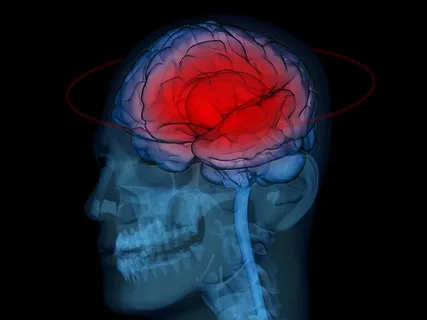New Research Shows Promise for Treating Traumatic Brain Injury Using Cellular Therapy
Scientists have developed a groundbreaking treatment for traumatic brain injury (TBI) utilizing the body’s own cells. According to a study published in PNAS Nexus, researchers successfully reduced brain lesions by 56% and significantly decreased local inflammation levels in pigs by leveraging macrophages, a type of white blood cell that can control inflammation.
The treatment involves attaching disk-shaped microparticles, called backpacks, containing anti-inflammatory molecules directly to the macrophages. These molecules help keep the cells in an anti-inflammatory state when they reach the site of brain injury, enabling them to reduce inflammation and mitigate the resulting damage.
TBI is a significant health concern, with millions of people affected worldwide each year. Currently, there is no specific treatment for TBI beyond managing symptoms. “We have applied our cellular backpack technology—which we previously used to improve macrophages’ inflammatory response to cancerous tumors—to deliver localized anti-inflammatory treatment in the brain, which helps mitigate the cascade of runaway inflammation that causes tissue damage and death in a human-relevant model,” said senior author Samir Mitragotri, Ph.D., from Harvard University.
In the United States alone, more than a million people suffer from TBI annually, with around 230,000 of them requiring hospitalization, and approximately 70,000 dying from TBI-related causes. TBI can cause severe brain tissue damage, and one of the main drivers of this damage is a runaway inflammatory response in the brain.
As cells die from the impact, they release pro-inflammatory cytokine molecules that attract immune cells to clean up the damage. However, these same molecules can also disrupt the blood-brain barrier, resulting in blood leaking into the brain. This blood accumulation causes swelling, reduced oxygen delivery, increased inflammation, and creates a vicious cycle of bleeding and damage that leads to further cell death.
The researchers saw an opportunity to address this issue using cellular therapy. Anti-inflammatory therapies have shown potential for the treatment of TBI, but none have proven clinically effective so far. Building upon previous work with macrophages, the researchers discovered that by utilizing their backpack technology, they could steer the behavior of the macrophages to reduce initial damage.
Macrophages have the ability to switch between pro-inflammatory and anti-inflammatory states. Previous research focused on keeping macrophages in a pro-inflammatory state when targeting tumor microenvironments. However, the researchers aimed to keep the macrophages calm in the inflammation-riddled setting of a brain injury.
To achieve this, the researchers developed disk-shaped backpacks containing two anti-inflammatory molecules: dexamethasone (a steroid) and interleukin-4 (a cytokine that encourages macrophages to adopt an anti-inflammatory state). In vitro experiments using human and pig macrophages demonstrated that the backpacks effectively attached to the cells without any negative effects. Additionally, the application of the backpacks reduced the expression of pro-inflammatory biomarkers and increased the expression of anti-inflammatory biomarkers in pig macrophages.
To prove the effectiveness of the treatment in living organisms, the researchers conducted in vivo tests using pigs, whose brain structures and responses to injury more closely resemble those of humans compared to mice. However, the scale-up production needed for the experiment was a significant challenge. They required 100 million macrophages and 200 million backpacks per subject—a scale similar to what would be administered in humans. The team, consisting of over 20 members from various institutions, successfully overcame this challenge.
The researchers infused backpack-carrying macrophages into the pigs’ bloodstream four hours after a TBI and analyzed the animals’ brains seven days later. The pigs that received the macrophage treatment displayed a high concentration of cells around the injury site, with lesions that were 56% smaller and significantly less hemorrhaging compared to untreated animals.
Furthermore, local immune cells in the treated pigs demonstrated lower levels of a pro-inflammatory activation marker, indicating that the macrophages successfully reduced inflammation in the brain. This data was further supported by lower levels of soluble biomarkers for inflammation in the blood and cerebrospinal fluid of treated animals compared to untreated ones, indicating the effectiveness of the macrophage treatment without any negative side effects.
The researchers plan to conduct further studies to understand how their anti-inflammatory macrophage therapy affects the integrity of the blood-brain barrier to prevent bleeding. This research could have significant implications for the treatment of other conditions, such as hemorrhagic strokes.
Donald Ingber, M.D., Ph.D., founding director of the Wyss Institute, commented on the study, stating, “This impressive study describes a truly novel and potentially powerful macrophage-based therapy for treating the inflammation that is the root cause of so many human afflictions in an effective and non-invasive way that works with biology rather than against it.”
The findings from this study offer hope for the development of a novel treatment for traumatic brain injury by utilizing the body’s own cells to reduce inflammation and mitigate damage. With further research and development, this approach could potentially revolutionize the treatment of TBI and improve outcomes for millions of patients worldwide.
*Note:
1. Source: Coherent Market Insights, Public sources, Desk research
2. We have leveraged AI tools to mine information and compile it




